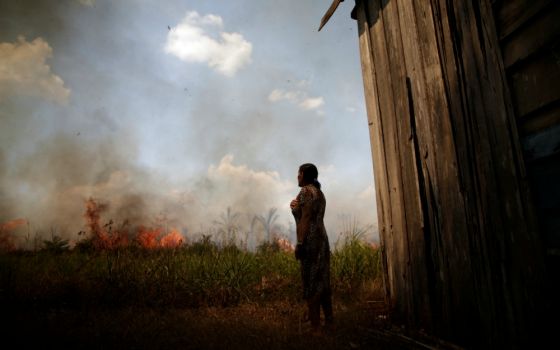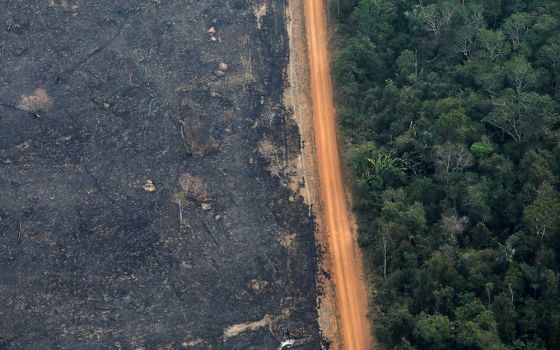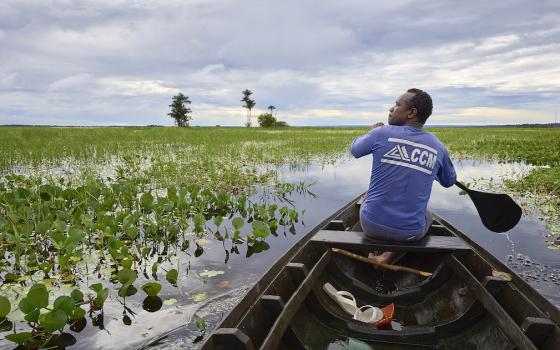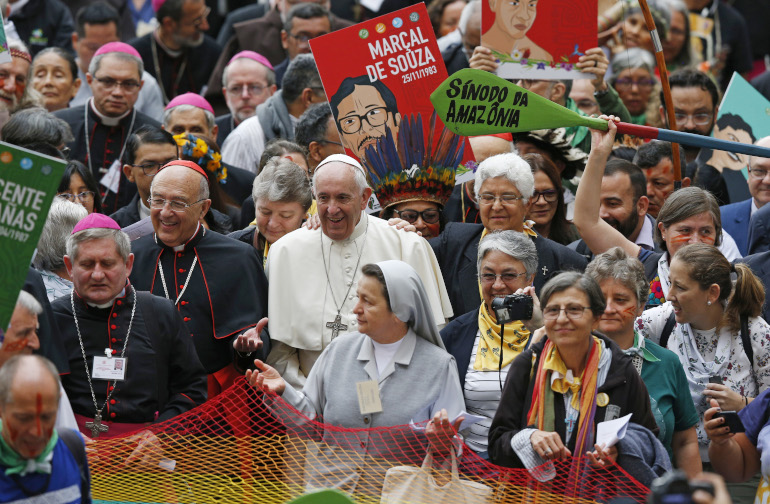
Pope Francis walks in a procession at the start of the Synod of Bishops for the Amazon at the Vatican in this Oct. 7, 2019, file photo. (CNS photo/Paul Haring)
Editor's Note: This story was updated at 2:26, central, with additional reactions to Pope Francis' apostolic exhortation on the Amazon synod.
"Injustice and crime."
With those two words, Pope Francis denounces in perhaps his strongest terms yet the unrestrained development in the Amazon that he says destroys one of the Earth's critical ecosystems and disenfranchises its indigenous peoples who for centuries have served as its caretakers.
"The businesses, national or international, which harm the Amazon and fail to respect the right of the original peoples to the land and its boundaries, and to self-determination and prior consent, should be called for what they are: injustice and crime," Francis writes in Querida Amazonia, ("Beloved Amazon"), his final reflection on the Vatican's special synod on the Amazon held in October.
The document, called an apostolic exhortation, was released midday Feb. 12 in Rome.
Throughout the 88-page text, Francis weaves insights from the Vatican's Amazon synod (Oct. 6-27) with his past writings — including drawing heavily from his 2015 encyclical "Laudato Si', on Care for Our Common Home" — and even native poetry to present a hopeful image of the universal Catholic Church allied with the Amazon: its people, its culture, its heritage, its ecology.
"Today the Church can be no less committed," he writes. "She is called to hear the plea of the Amazonian peoples and 'to exercise with transparency her prophetic mission.'"
José Gregorio Diaz Mirabal, coordinator for the Indigenous Organizations of the Amazon who attended the Vatican synod, welcomed "the support of a powerful ally, this valiant Pope" in their fight for their lives, and the survival of the rainforest, playing out in the Amazon.
"Throughout the rainforests of Latin America, we are battling governments that treat us like criminals for saying no to projects that would dam our rivers, carve roads of ruin through our forests and turn our land into lifeless deserts and our rivers into liquid poison," Diaz Mirabel said in a statement, who added indigenous peoples must have rights to their traditional territories.
Josianne Gauthier, secretary general of the Catholic development network CIDSE and a partcipant in the Amazon synod, said the pope's exhortation advances the synod's process of reflection that began with the Amazon communities themselves, and leads Catholics to more in-depth consideration of critical political issues, such as the overexploitation of natural resources, human rights violations and an economic model that threatens the survival of species and cultures.
"We hear once again a call to listen to the voices and wisdom of traditional cultures, to question our model of development and our idea of progress and measure it against the destruction of nature and the violence against those who defend it," she said in a statement.
While many expected the pope to directly weigh in on some of the major proposals coming out of the synod's final document — on environmental matters, a definition for ecological sin, divestment from environmentally destructive companies and new ecologically-centered church ministries — Francis for the most part bypassed the opportunity, stating early on that he did not intend to supersede the synod bishop's final document or retread over every issue it examined.
Advertisement
Instead, he said his goal was to propose a brief synthesizing framework "for reflection that can apply concretely to the life of the Amazon region" and advance "a harmonious, creative and fruitful reception of the entire synodal process." He presents a vision of the Catholic Church in the Amazon united in defense of its tribes, trees, tradition and tributaries, offering an example for the wider church to adopt in other corners of the globe.
"The beloved Amazon region stands before the world in all its splendor, its drama and its mystery," Francis writes in the first line of Querida Amazonia, which he addresses "to the whole world" in an effort "to help awaken their affection and concern for that land which is also 'ours,' and to invite them to value it and acknowledge it as a sacred mystery."
The Amazon Basin stretches across nine countries and more than two million square miles. Home to perhaps the planet's greatest biodiversity, along with 33 million people, 400 different tribes, more than 100 of which live in voluntary isolation, the biome produces one-fifth of the world's fresh water, one-fourth of its oxygen, and one-third of global forest reserves.
It is also an epicenter in the battle between development and preservation, not only of the environment but the lives and cultures of people who have called it home for centuries. Those conflicts arose to an international audience in the months leading up to the Amazon synod, as massive fires blazed in the rain forest — a critical carbon sink for the planet — in part due to deforestation for farming and ranching purposes.
In December, scientists reported the combination of deforestation, wildfires and rising temperatures has pushed the Amazon to a "tipping point" that could see parts of its dense forests change into savanna, and with it pose destructive consequences for biodiversity, the climate and human well-being. Last week, a separate scientific study found that one fifth of the Amazon now produces more carbon dioxide emissions than it absorbs, what the scientists attribute in large part to deforestation.
"The equilibrium of our planet also depends on the health of the Amazon region," the pope writes.
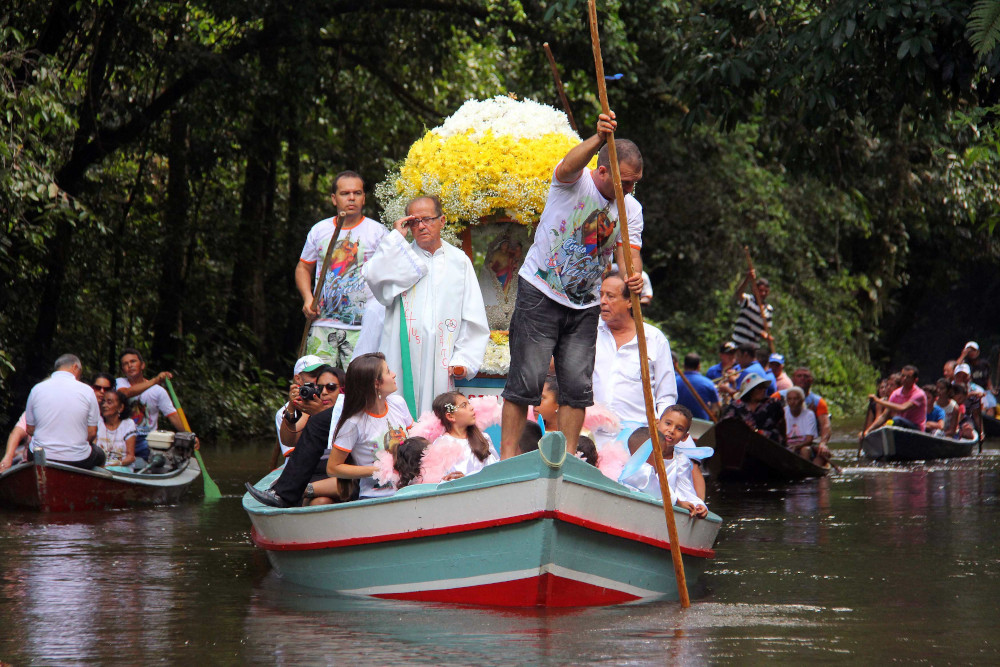
Pilgrims travel in boats as they accompany the statue of Our Lady of Nazareth during an annual river procession and pilgrimage along the Apeu River to a chapel in Macapazinho, Brazil, Aug. 3, 2014. (CNS/Reuters/Ney Marcondes)
'A cry that rises up to heaven'
Francis frames his reflections in Querida Amazonia through "four great dreams" inspired in him by one of Earth's great biomes: one social, one cultural, one ecclesial and one ecological.
Describing his ecological hopes for the region he writes, "I dream of an Amazon region that can jealously preserve its overwhelming natural beauty and the super-abundant life teeming in its rivers and forests."
But the present reality, he concedes, is one wrought with exploitation and exclusion, as ever-expanding logging and mining activities extract resources from the land while expelling indigenous people, its African descendants and others reliant on the Amazon River from their ancestral homes. Such colonizing interests, both legal and illegal, Francis said, are "provoking a cry that rises up to heaven."
"The inescapable truth is that, as things stand, this way of treating the Amazon territory spells the end for so much life, for so much beauty, even though people would like to keep thinking that nothing is happening," Francis writes near the beginning of chapter three, which focuses on ecology.
"The interest of a few powerful industries should not be considered more important than the good of the Amazon region and of humanity as a whole," he adds.
He condemns the colonizing presence, both past and present, in the Amazon. He cited Pope John Paul II's assertion nearly two decades ago that "we cannot allow globalization to become 'a new version of colonialism.' "
"The inescapable truth is that, as things stand, this way of treating the Amazon territory spells the end for so much life, for so much beauty, even though people would like to keep thinking that nothing is happening."
— Pope Francis
Returning to the theme of integral ecology from Laudato Si', set to mark its fifth anniversary this spring, Francis stresses that environmental and social issues are interrelated, and because of that "a true ecological approach always becomes a social approach."
"We do not need an environmentalism 'that is concerned for the biome but ignores the Amazonian peoples,' " he says, citing the synod's preparatory instrumentum laboris.
CIDSE, the network of predominantly Europe-based Catholic development agencies, welcomed Francis' exhortation, calling it "an invitation to reacquaint ourselves with the fundamental messages of Laudato Si'." It added the pope's conclusions, as well as those from the synod participants, underpinned its decades of work in the Amazon region "listening to the voices and demands of local communities."
Likewise, Susan Gunn, director of the Maryknoll Office for Global Concerns said "The Holy Father is speaking the Maryknoll language" when he urges all people of God and good will to pursue a culture of encounter and dialogue in working for justice for the Amazon and its people. The Maryknoll publicy policy arm added that two groups Francis references, pastoral workers and Christian base communities, are well positioned to preach the Gospel and work for dignity and justice.
"As Pope Francis stated, ecology and social justice are intrinsically linked and the Amazonian region is a clear example of how fragile such a balance can be," CIDSE said in its statement. "But it is also true beyond the Pan-Amazonian region: it's an entire world system that allows multinational corporations to exploit land and resources without paying enough attention to the consequences on the people and on the environment."
Throughout Querida Amazonia, the pope assails industrial development, both foreign and domestic, ripping lands from indigenous people, who then migrate from the Amazon's great forests and riverbanks into the cities where they experience "enslavement, subjection and poverty." He notes that with the loss of ancestral homes often comes the loss of culture and identity.
"The original peoples often witnessed helplessly the destruction of the natural surroundings that enabled them to be nourished and kept healthy, to survive and to preserve a way of life in a culture which gave them identity and meaning," he writes, adding that "The cry of the Amazon region does not rise up from the depths of the forests alone, but from the streets of its cities as well."
Francis calls for the Amazon's indigenous people to be empowered through education and the right to a deciding voice in development decisions on their land.
"The original peoples," he wrote, "have a right to receive — in addition to basic education — thorough and straightforward information about projects, their extent and their consequences and risks, in order to be able to relate that information to their own interests and their own knowledge of the place, and thus to give or withhold their consent, or to propose alternatives."
In a statement, the Global Catholic Climate Movement said the pope's exhortation, and particularly his backing of indigenous peoples, "has special resonance" at a time when Brazilian President Jair Bolsonaro last week proposed permitting commerical mining and industrial projects like hydroelectric dams on protected indigenous lands.
With Querina Amazonia, "Pope Francis strongly endorses the role of indigenous people as the guardians of creation," said Rome-based Global Catholic Climate Movement, which represents a network of 900 Catholic groups worldwide.
Added Dom Roque Paloschi, president of the Indigenous Missionary Council of the Brazilian Bishops’ Conference, "It is imperative that the Church have a prophetic voice and an unconditional commitment to the defense of the poorest and most vulnerable."
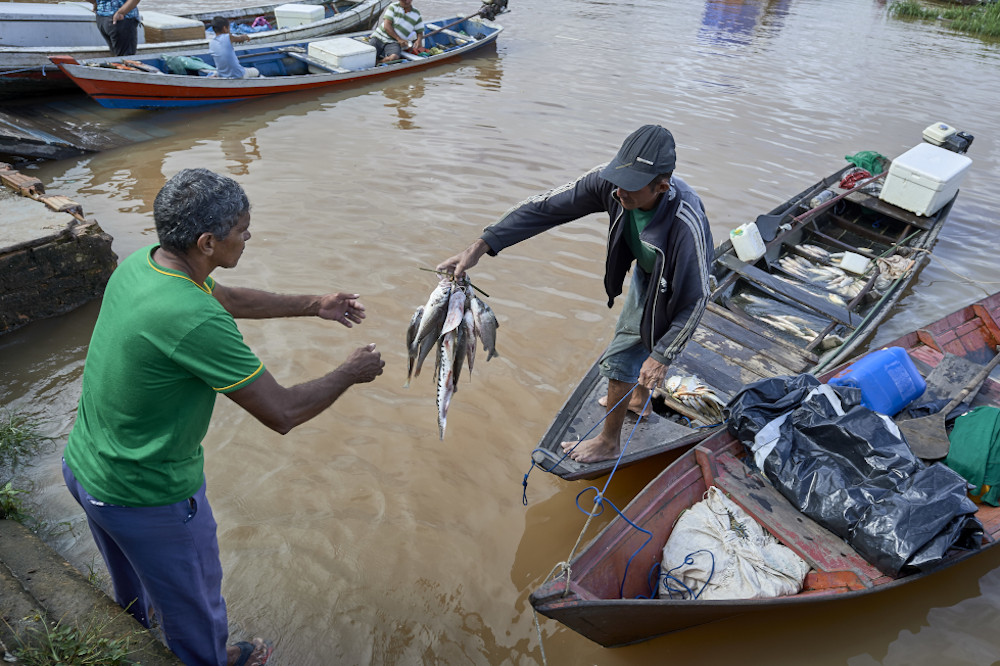
A fisher sells part of his catch at the dock in Santarem, a city alongside the Amazon River in Brazil's northern Para state. (CNS/Paul Jeffrey)
No to distractions from destruction
The pope's depictions in Querida Amazonia build on and reflect those from the synod itself, both in its final document and the personal testimonies of indigenous leaders to traveled to Rome to tell them directly to the church, as well as the 260 listening sessions conducted by the Pan Amazon Ecclesial Network.
In his exhortation, Francis refrains from endorsing or even citing specific actions introduced by the synod bishops in their final document.
Left unmentioned is ecological sin, which the synod bishops proposed to define as "an action or omission against God, against others, the community and the environment." Still, the pope has referred to ecological sin several times since the synod's conclusion and has indicated its eventual inclusion into the Catechism of the Catholic Church.
Other recommendations of the synod bishops that Francis leaves untouched include the development of "common home" training programs and the creation of special environmental care ministers. He also refrains from commenting on the call of the synod bishops, many of whom hail from the Amazon, for the church in the region to join and support divestment campaigns from companies engaged in what they labeled socio-ecological destruction.
And while the pope called for immediate steps to address climate change in messages to the United Nations and energy executives, he limits his comments in Querida Amazonia, referring only at separate points to the need to seek out alternative, non-polluting energy sources and the Amazon's important role as "a great filter of carbon dioxide, which helps avoid the warming of the earth."
One appeal Francis does make is renewing his call in Laudato Si' for all people to "insist on the urgent need" to establish clear boundaries and ensure the protection of ecosystems power- and economic-seeking forces. He adds that it's important for Christians to encounter the Amazon region from a theological focus, "a space where God himself reveals himself and summons his sons and daughters."
The pope also calls on people to not "let our consciences be deadened" or distracted to the serious destruction facing the planet, which he says "dull our realization of just how limited and finite our world really is." He says a true integral ecology encourages new habits to counter the consumerism and culture of waste prevalent in the cities of the Amazon and elsewhere.
"A sound and sustainable ecology, one capable of bringing about change, will not develop unless people are changed, unless they are encouraged to opt for another style of life, one less greedy and more serene, more respectful and less anxious, more fraternal," Francis declares.
At several points, Francis refers to the concept of "good living," or buen vivir, common among indigenous people in the Amazon. He describes it as a communal approach to life that finds harmony, joy and fulfillment simple living and "God's little gifts" while responsibly caring for nature to preserve it for future generations.
Gauthier, the CIDSE secretary general, said that Francis' exhortation asks all people to not only listen to the cries of the Amazon's indigenous people and biodiversity, but to also examine their own lives and the way personal choices can contribute to the suffering of others. During the synod, CIDSE promoted its sustainable lifestyles program "Change for the Planet-Care for the People," which it began in 2015.
"This is not just about the Amazon, it is about all of us, our way of life, our responsibilities, our colonial mindsets, and how we justify ourselves instead of questioning our own consumerist behaviour," Gauthier said.
"From the original peoples," Francis writes, "we can learn to contemplate the Amazon region and not simply analyze it, and thus appreciate this precious mystery that transcends us. We can love it, not simply use it, with the result that love can awaken a deep and sincere interest. Even more, we can feel intimately a part of it and not only defend it; then the Amazon region will once more become like a mother to us."
[Brian Roewe is an NCR staff writer. His email address is broewe@ncronline.org. Follow him on Twitter: @BrianRoewe.]
Editor's note: A previous version of this article incorrectly stated the size of the Amazon Basin as more than two million square acres. It is more than two million square miles.





